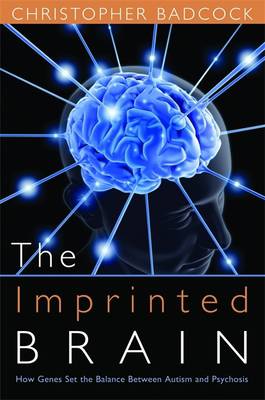
- Retrait gratuit dans votre magasin Club
- 7.000.000 titres dans notre catalogue
- Payer en toute sécurité
- Toujours un magasin près de chez vous
- Retrait gratuit dans votre magasin Club
- 7.000.0000 titres dans notre catalogue
- Payer en toute sécurité
- Toujours un magasin près de chez vous
The Imprinted Brain

How Genes Set the Balance Between Autism and Psychosis
Christopher BadcockRécompenses
Description
The Imprinted Brain sets out a radical new theory of the mind and mental illness based on the recent discovery of genomic imprinting. Imprinted genes are those from one parent that, in that parent's interest, are expressed in an offspring rather than the diametrically opposed genes from the other parent. For example, a higher birth weight may represent the dominance of the father's genes in leading to a healthy child, whereas a lower birth weight is beneficial to the mother's immediate wellbeing, and the imprint of the mother's genes will result in a smaller baby. According to this view, a win for the father's genes may result in autism, whereas one for the mother's may result in psychosis. A state of equilibrium - normality - is the most likely outcome, with a no-win situation of balanced expression. Imprinted genes typically produce symptoms that are opposites of each other, and the author uses psychiatric case material to show how many of the symptoms of psychosis can be shown to be the mental mirror-images of those of autism.
Combining psychiatry with insights from modern genetics and cognitive science, Christopher Badcock explains the fascinating imprinted brain theory to the reader in a thorough but accessible way. This new theory casts some intriguing new light on other topics as diverse as the nature of genius, the appeal of detective fiction, and the successes - and failures - of psychoanalysis. This thought-provoking book is a must-read for anyone with an interest in autism, psychiatry, cognitive science or psychology in general.Spécifications
Parties prenantes
- Auteur(s) :
- Editeur:
Contenu
- Nombre de pages :
- 240
- Langue:
- Anglais
Caractéristiques
- EAN:
- 9781849050234
- Date de parution :
- 15-05-09
- Format:
- Livre relié
- Format numérique:
- Genaaid
- Dimensions :
- 155 mm x 236 mm
- Poids :
- 498 g

Les avis
Nous publions uniquement les avis qui respectent les conditions requises. Consultez nos conditions pour les avis.








